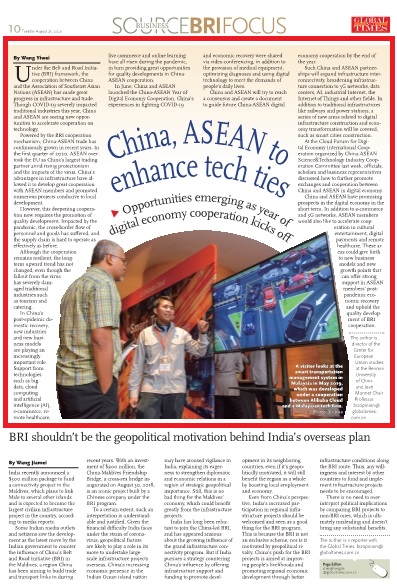Belt and Road
Your Present Location: PROGRAMS> Belt and RoadWang Yiwei: China, ASEAN to enhance tech ties under BRI framework
By Wang Yiwei Source: Global Times Published: 2020-08-25
Under the Belt and Road Initiative (BRI) framework, the cooperation between China and the Association of Southeast Asian Nations (ASEAN) has made great progress in infrastructure and trade. Though COVID-19 severely impacted traditional industries this year, China and the ASEAN are seeing new opportunities to accelerate cooperation on technology.

Powered by the BRI cooperation mechanism, China-ASEAN trade has continuously grown in recent years. In the first quarter of 2020, ASEAN overtook the EU as China's largest trading partner amid rising protectionism and the impacts of the virus. China's advantages in infrastructure have allowed it to develop great cooperation with ASEAN members and promoted numerous projects conducive to local development.
However, this deepening cooperation now requires the promotion of quality development. Impacted by the pandemic, the cross-border flow of personnel and goods has suffered, and the supply chain is hard to operate as effectively as before. Although the cooperation remains resilient, the long-term upward trend has not changed, even though the fallout from the virus has severely damaged traditional industries such as tourism and catering.
In China's post-epidemic domestic recovery, new industries and new business models are playing an increasingly important role. Support from technologies such as big data, cloud computing and artificial intelligence (AI), e-commerce, remote healthcare, live commerce and online learning have all risen during the pandemic, in turn providing great opportunities for quality developments in China-ASEAN cooperation.
In June, China and ASEAN launched the China-ASEAN Year of Digital Economy Cooperation. China's experiences in fighting COVID-19 and economic recovery were shared via video-conferencing, in addition to the provision of medical equipment, optimizing diagnoses and using digital technology to meet the demands of people's daily lives.

A visitor looks at the smart transportation management system in Malaysia in May 2019, which was developed under the cooperation between Alibaba Cloud and a Malaysia tech firm. Photo: Xinhua
China and ASEAN will try to reach a consensus and create a document to guide future China-ASEAN digital economy cooperation by the end of the year.
Such China and ASEAN partnerships will expand infrastructure interconnectivity, broadening infrastructure connection to 5G networks, data centers, AI, industrial Internet, the Internet of Things and other fields. In addition to traditional infrastructures like railways and power stations, a series of new areas related to digital infrastructure construction and economy transformation will be covered, such as smart cities construction.
At the Cloud Forum for Digital Economy International Cooperation organized by China-ASEAN Science&Technology Industry Cooperation Committee last week, officials, scholars and business representatives discussed how to further promote exchanges and cooperation between China and ASEAN in digital economy.
China and ASEAN have promising prospects in the digital economy in the short term. In addition to e-commerce and 5G networks, ASEAN members would also like to accelerate cooperation in cultural entertainment, digital payments and remote healthcare. These areas could give birth to new business models and new growth points that can offer strong support in ASEAN members' post-pandemic economic recovery and uphold the quality development of BRI cooperation.
The author is a senior fellow of Chongyang Institute for Financial Studies at Renmin University of China.























































































 京公网安备 11010802037854号
京公网安备 11010802037854号





